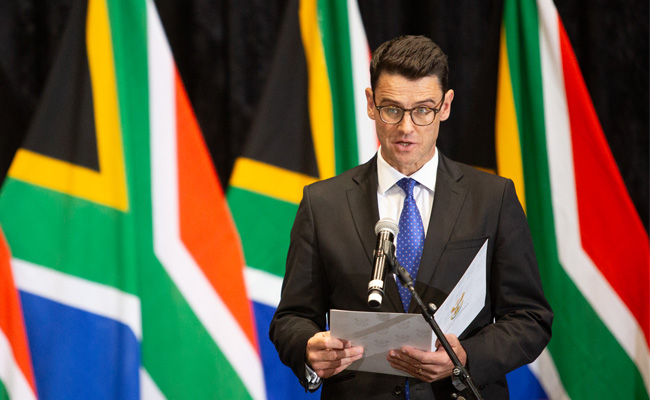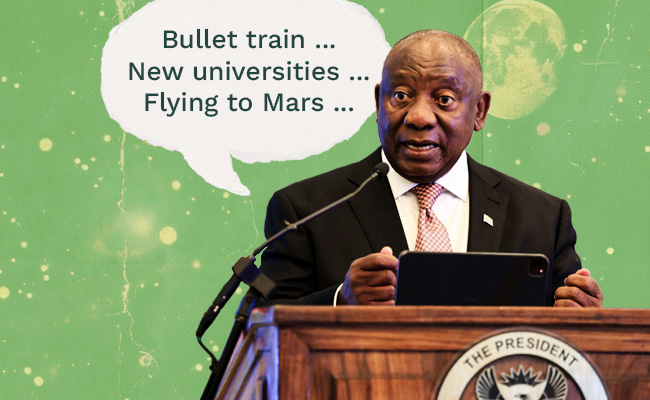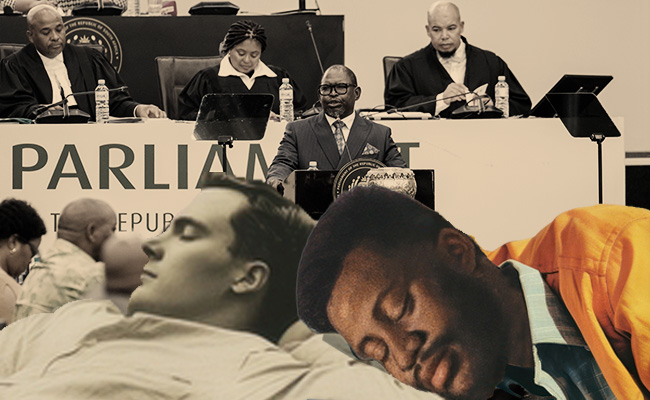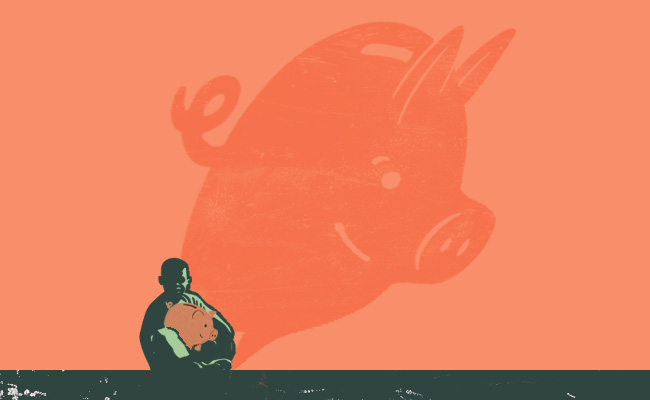Joan Rivers, the American comedian and talk-show host who died in 2014 at the age of 81, was renowned for a sharp tongue at the end of which lay much wisdom. At this point, both John Steenhuisen and Cyril Ramaphosa could learn a thing or two from Rivers, most particularly her throwaway line that half of all marriages end in divorce – and then there are the really unhappy ones.
Over the past few days, Steenhuisen and Ramaphosa, the lead partners of their parties in the coalition government, have stalked around each other like bitter spouses, levelling all sorts of passive aggressive allegations out of the sides of their mouths. Yet, like any gloriously toxic marriage, both have refused to call it quits on their union.
“You divorce me,” they both pretty much said; “I don’t even want to be here; I’m just sticking it out for the kids.”
You’d be forgiven for thinking they want each other to suffer through the painful cocktail parties, the excruciating family meetings.
On Saturday, Steenhuisen, the leader of the DA and agriculture minister in Ramaphosa’s executive, convened a press conference at which he ripped into his boss in the cabinet, as well as the ANC.
“At every instance when President Ramaphosa has chosen to protect corruption accused in his own ranks, while treating his coalition partner with contempt, he has sought to justify the actions by hiding behind something called presidential prerogative,” he said.
And yet, as furious as Steenhuisen is, his party won’t be quitting the coalition – it has simply resolved to make things hell around the house.
First, the silent treatment: Steenhuisen said the party will “withdraw” from Ramaphosa’s national dialogue, which he said was little more than an “expensive talk shop”, coming at an estimated cost of R700m. (It’s hard to disagree on this point, given the history.)
Second, the DA is going to run interference on how money is spent around here by voting against the budgets of “corruption-accused ministers”. The DA is even “considering” a vote of no-confidence in Ramaphosa himself.
So why not just call it quits then? Won’t this get the DA’s message across more succinctly, Steenhuisen was asked at Saturday’s press briefing.
“No,” he said. “A more impactful way would not have been to leave the government of national unity, because that would open South Africa up to the coalition of chaos and destruction [involving Julius Malema’s EFF or Jacob Zuma’s MK Party].”
This would be worse for everyone, he said – a point reiterated by DA federal executive chair Helen Zille. “We won’t do him a favour and leave. He must fire us,” said Zille, never one to mince her words.
The ANC is gritting its teeth just as furiously, in its desire not to cede the moral high ground to its opposition.
Speaking to the media later on Saturday, ANC spokesperson Mahlengi Bhengu-Motsiri described the DA’s machinations as “an attempt to disrupt” the workings of the coalition government.
But asked why, if the ANC is so evidently scandalised by the DA’s behaviour, it doesn’t just boot it out, she was mealymouthed.
“The ball is in the court of the DA to make a decision about whether they are part of the [government], or whether they are a quasi-opposition party within the executive,” she said.
Anyway, she said that on Monday, the ANC’s national working committee will meet and “do a thorough reflection of the implications, political and governance implications of what was articulated by the DA”.
Cognitive dissonance
We’ve heard the parents muttering about a split before, of course. Last year, it was a new education law which would effectively strip school governing bodies of certain powers, including on language policy. Two months ago, it was the budget that nearly bust the coalition.
The reason for this new new crisis is that last week, Ramaphosa summarily axed Andrew Whitfield as deputy trade, industry and competition minister. Whitfield was a DA deployee, and one of the few of the party’s members picked by Ramaphosa to serve in cabinet.
On Friday, Ramaphosa begrudgingly explained why he’d done it, but only after he had whinged that “it is not common practice” for the president to “provide reasons” for the axing of ministers.
This is deeply revealing of Ramaphosa’s attitude to accountability, as explaining removing any member of the executive is precisely what every president ought to do. If this hasn’t happened before, well that’s hardly any excuse.
Nonetheless, Ramaphosa said: “Whitfield was removed as a deputy minister because he undertook an international visit without the permission of the president. His travel to the US was a clear violation of the rules and established practices governing the conduct of members of the executive.”
Whitfield’s excuse was that this was a visit on behalf of the DA, and he had sent Ramaphosa a letter asking for permission 10 days before he went, which Ramaphosa had ignored. And Whitfield sent a letter apologising afterwards.
Ramaphosa wasn’t mollified. On Friday, he dismissed this as a “perfunctory letter of apology”, pointing out that Nelson Mandela had axed his then wife Winnie Madikizela Mandela from his cabinet in 1995 for travelling without permission, while Thabo Mbeki had done the same to Nozizwe Madlala-Routledge.
Ramaphosa said that given this precedent, there are no grounds for Steenhuisen to “issue ultimatums and threats”. Frankly, he said, he is “amazed at Mr Steenhuisen’s intemperate reaction to the removal of Mr Whitfield”.
After news of Whitfield’s axing emerged on Thursday, Steenhuisen had given Ramaphosa 48 hours to fire two ministers: housing minister Thembi Simelane, in trouble for backroom shenanigans with VBS Mutual Bank while she was mayor of Polokwane; and higher education minister Nobuhle Nkabane, who lied to parliament about how the sector education and training authorities were constituted.
Steenhuisen hoped to draw attention to the obvious cognitive dissonance: Whitfield gets fired for not getting permission for a trip overseas, a low-level misdemeanour, yet two ministers implicated in actual serious wrongdoing continued to serve at the pleasure of the president.
In a more sinister vein, a number of DA officials believe that Whitfield’s missing permission slip is just a fig leaf for the real reason he was booted: refusing to enable more looting and wasteful spending in the trade, industry and competition portfolio.
“If you look at the uncomfortable questions that Whitfield had been raising around things like the Transformation Fund … and also, the way in which he has been significantly sidelined in the [decision to appoint a winning bidder for the next] lottery, it is very, very clear why he was actually removed, when people have committed far more serious acts,” Steenhuisen said bluntly.
Both of those are contentious issues. The Transformation Fund is a pet project of Whitfield’s ex-boss, trade, industry and competition minister Parks Tau, and would see companies pay a part of their profits into this new fund. But it has been roundly panned as unnecessary, and a further avenue for corruption.
The lottery is even more scandalous: amaBhungane revealed last week that one of the shareholders in Sizekhaya Holdings, which will take over running the national lottery, is the sister-in-law of deputy president Paul Mashatile. For the deputy president’s wider family to be in the running for a contract worth R7bn is precisely the sort of conflict of interest that tells the lie to Ramaphosa’s “reform” project.
While Ramaphosa might decry this speculation for axing Whitfield as a conspiracy theory, a number of people clearly believe this to be true.
As the well-respected political analyst Ralph Mathekga said on Radio 702 last week: “Whitfield has been asking difficult questions … it makes no sense to remove someone like that at a moment like this.”
A weak record
Both Ramaphosa and Steenhuisen have done their performative best to illustrate how they’ve been shafted by the other. And on the face of it, it looks appallingly bad for the president. But there are, in mitigation for him, some shades of grey.
For starters, Ramaphosa had specifically told his executive not to travel to the US while tensions were bubbling between South Africa and US President Donald Trump and, apparently, two other ministers had cancelled their plans to do so, given this order – environmental minister Dion George, and correctional services minister Pieter Groenewald. Whitfield, however, went ahead.
Ramaphosa is also right that Mandela and Mbeki had fired their ministers for similar transgressions – and this is an important precedent.
And yet, ultimately, the president remains on the wrong side of this decision. What makes it different this time is that firing Madikizela Mandela and Madlala-Routledge were not decisions taken against opposition party politicians in a brittle coalition. And, pointedly, both Mandela and Mbeki had a far stronger record on axing those accused of corruption – it was Mbeki, for instance, who fired his own deputy, Jacob Zuma.
You’d be hard pressed, at this point, to imagine Ramaphosa would do the same, given a similar set of circumstances.
The way Mathekga sees it, Ramaphosa’s decision is “difficult to explain”, and he should have been more circumspect given the tenuous state of the coalition. “There isn’t what one could call a prima facie case of transgression here, and also, it’s about what’s not being done on the other side [such as with] the higher education minister,” he said.
It is this juxtaposition which does Ramaphosa no favours. Allowing Simelane and Nkabane to remain ensconced in their cabinet positions, while axing an opposition party member for not filling out his permission slip, throws his inaction on the really serious stuff onto the big screen.
Top image: Former trade, industry and competition deputy minister Andrew Whitfield at the swearing-in ceremony of the executive on July 3 2024. Picture: Gallo Images/Misha Jordaan.
Sign up to Currency’s weekly newsletters to receive your own bulletin of weekday news and weekend treats. Register here.











